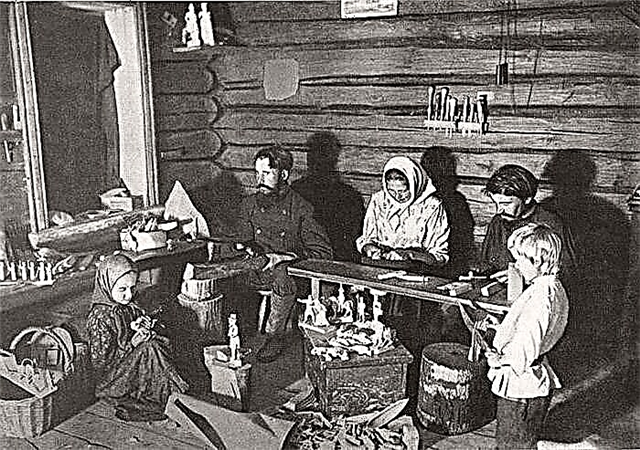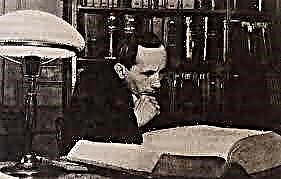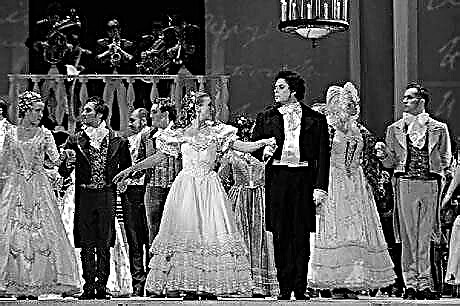: USA, XIX century. A young self-confident financier makes great strides, but by chance becomes bankrupt. Love of a beautiful woman, flair and fortune help him to get back on his feet.
I-LIX Chapters
Frank Algernon Cowperwood has been attracted to the world of finance since childhood. At the age of 14, he cranks out the first commercial adventure - he buys and resells soap. Already in adolescence, he is interested in exceptionally beautiful girls. At seventeen, Cowperwood dropped out of school and began working. “Frank's appearance ... in those years was inviting and enjoyable. Tall ..., broad-shouldered and well-cut, with a large beautiful head and thick, curly dark brown hair. A lively thought shone in his eyes, but their eyes were impenetrable ... "
In the house of his father, Henry, also a bank financier, the Sample couple often appears. Frank is fascinated by the 24-year-old Lilian Sample. “It is difficult to say what attracted the young Cowperwood to her, for neither in temperament nor in mind was she equal to him ... Lilian had thick, magnificent hair of an ash-colored shade, pale ... face, soft pink lips and a straight nose. Her gray eyes, depending on the lighting, seemed now blue, then completely dark. Her hands were striking with subtlety and beauty ... Cowperwood was fascinated by her appearance. "
After some time, Mrs. Sample's husband dies. Ignoring the difference in five years, Frank takes care of Lillian. He manages to charm a woman, and she marries him. For four years of marriage, they have a son, Frank, and a daughter, Lilian.
Having worked in various firms and put together the initial capital, Cowperwood begins his accounting and bill business. He believes in the future of horse railways and invests a lot of money in stocks. Frank understands that all officials in Philadelphia and the state of Pennsylvania are engaged in speculation.
During the civil war in the South and the North, he enlisted the support of the Irishman Edward Butler to take a loan, which allows Cowperwood to declare himself and compete with other major financiers. Butler is a prominent figure in the political world and has extensive connections in higher circles. He is very sympathetic to the young financier.
Frank notes the beauty and youthful freshness of Butler's eldest daughter Eileen, a blue-eyed girl with reddish-golden hair. Butlers, along with their children (daughters Nora and Eileen and sons Cal and Owen) become frequent guests at the Cowperwood House. 18-year-old Eileen annoys Lillian and Frank's sister Anna with her vagaries and fervent disposition. Frank, on the contrary, considers the girl alive and cheerful. Eileen also likes Cowperwood. She plays the piano and sings in his house only in the presence of Frank.
A turning point in Cowperwood’s career was a collaboration with George Stiner, the city treasurer. Stiner is a toy of the Republican party, namely financial tycoons: Butler, Mollenhower and Senator Simpson. They need a man who knows how to wrap money from the city treasury. For this, Cowperwood is invited. All participants in the case receive a good income from such financial transactions. Behind the backs of the three main influential figures, Stiner and Cowperwood (on Frank's advice) are starting to buy up shares of horse-railway lines through nominees.
Frank and his father are building mansions interconnected. The decoration of the houses is of good taste. At this time, the financier begins to collect works of art.
A romance begins between Cowperwood and Eileen. Despite the Catholic upbringing, the girl does not think that her love is criminal. Frank is not used to reckoning with moral and religious considerations. “My desires are above all,” is his motto.
The Chicago fire on October 7, 1871 at the moment destroys the financial well-being of Cowperwood. The fire that engulfed the trading part of the city causes stock market panic. Frank put into circulation five hundred thousand from the city treasury, and now this is his biggest problem. There is no stiner in the city, and Cowperwood decides to honestly tell Butler everything, hoping that he and Mollenhauer and Simpson will not allow the paper to depreciate. The banker also mentions the upcoming elections: the disappearance of such a huge amount from the treasury will quickly reveal itself, and Stiner, as the representative of the Republicans, will cast a shadow over the party. Butler drives him to two other aces. However, everyone sees what is happening to their benefit and, although they sympathize with Frank, do not consider it necessary for themselves to help him. At the same time, Butler receives an anonymous letter stating that Eileen is confused with Cowperwood. The daughter's reaction to the letter confirms what is written. The old Irishman at the moment embraces hatred for Frank. Butler decides to drown the villain, taking advantage of the upcoming threat of bankruptcy of Cowperwood.
Steener, a man limp and short-sighted, the three bigwigs managed to convince in no case to lend Frank anymore with city money. A new loan could save both Cowperwood and Steener, in addition to bringing them financial profit. The treasurer fears the wrath of his masters, and, despite all the banker's reasonable arguments, refuses Cowperwood. Frank, contrary to his order, manages to take a check for 60 thousand dollars from his secretary Albert Styres.
Lilian also receives an anonymous letter, but it does not indicate the name of Frank's mistress. “She knew that he was selfish, preoccupied only with himself and far from being so carried away by her as before. Her fears about the difference in their age have gradually come true. ” But decency, children and habit suggest to stay with Cowperwood, especially now, when he faces bankruptcy.
Frank declares himself insolvent. Before the election, it is possible to hide the theft from the treasury, after the trial begins against Cowperwood and Steener. Butler did his best for this, although by law the banker does not bear any responsibility. It was the ill-fated check issued by the secretary that became the reason to accuse Frank of deliberate theft.
All attempts by the Irish to force Eileen to leave and abandon her lover are futile. The old man decides on an extreme step: he turns to the Pinkerton agency and tracks down detectives Eileen and Cowperwood in a date house. The daughter is terribly offended: the father exposed her secret to strangers. How low!
Eileen leaves home to live with her friend, despite the adoration of domestic ones. Only with Frank's help is Edward able to get her home. Father understands that he cannot convince Eileen. The hope is only for the court to admit Cowperwood's guilt.
The banker hires an intelligent lawyer, Harper Steger. However, Attorney Dennis Shannon and Judge Peiderson are Butler’s people. Frank and his lawyer rely on the jury, but they pass a guilty verdict. The stager is appealing, but this has no effect. The financier will serve four years and three months in East Prison.
Cowperwood does not lose his presence of spirit and courageously accepts his fate. For his whole family and wife, this is a heavy blow. Eileen alone is determined to fight for her Frank, although she is in despair. Both luxurious mansions - Frank and his father - go under the hammer for debts.
Once in prison, Cowperwood sees a stark contrast between his former life and his present. Now he will live in a cramped chamber with rats. He is given a job - to weave chairs, which brightens up the monotony of the prisoner's everyday life.
Cowperwood was liked by the head of the prison, Michael Desmas, and Desmas' obliging subordinate, Bonheg, for Frank makes all kinds of concessions: a prisoner from the house is brought the right things, goodies, more than three months (which was a violation of prison rules) he can write letters and meet with visitors.Therefore, as soon as such an opportunity appeared, Eileen comes to her beloved.
For the first time in his life, Cowperwood is betrayed by his composure, and he cries on Eileen's shoulder. "Her love was so limitless, so genuine ..." At the same time, "her soul was overwhelmed by a frantic, merciless rage against life ... Father - damn him! Relatives - what is she up to them! .. Frank for her - all! " She helps her beloved to regain control of herself.
On a date with Lillian, Frank asks her for a divorce. They have completely different outlooks on life, and he loves another. Lilian refuses to get divorced.
Thirteen months later, both Steener and Cowperwood are released. This is due to the death of Edward Butler. Eileen all this time emphasized herself coldly with her father, which did not hide from her brothers. Soon they find out the reason, and begin to disdain their sister.
While Frank was in prison, Wingate, an honest and conscientious person, led his business. All this time, Cowperwood advised him, Frank's younger brothers, Joseph and Edward, worked at Wingate & Co.. Therefore, when the financier was released, he continued his business as a broker.
The largest credit institution, JC Cook & Co., has invested a lot of money in the construction of the railway in the uninhabited territories, which amounted to almost a third of the United States. But on September 18, 1873, the company went bankrupt. The stock exchange immediately begins to panic. Cowperwood's time has come!
In just a few days, selling and buying everything you can, Frank makes a lot of money on the difference. He is a millionaire. Now nothing holds him in Philadelphia. Because of the stigma of the prisoner, Frank can no longer regain his former reputation. Cowperwood receives a divorce from Lilian and leaves with Eileen in Chicago.
Something about Mycteroperca Bonaci
The author, using the example of fish Mycteroperca Bonaci, simply black sea bass, discusses creative power. Due to changes in skin pigmentation and the ability to adapt, fish can evade pursuit and insidiously attack stealthily. "For what purpose did perch endow this feature with omnipotent and intelligent nature? .. can it be mistaken for a tool of deception, for personification of lies ..." Can this indicate that the visible world is only an illusion?
Magic crystal
“The three witches who praised Macbeth in a thunderstorm in a wasteland, having seen Cowperwood, could say”: “reality is only a loss of illusions for you,” for the heart is weary of life's experience, and the soul is cold as night. Eileen, they could have promised a lot of anxieties, hopes, crumbled in dust, love, flying like a dandelion, and fading in the darkness!
“And all this would be true. In such a beginning, no rational person can see the other end. "












